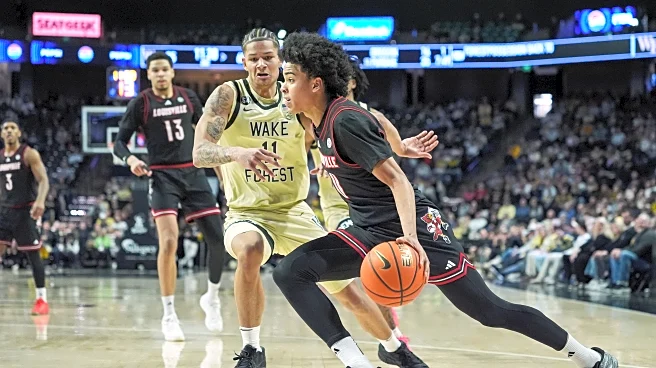What is the story about?
What's Happening?
American retailers are bracing for a challenging holiday season as economic pressures, including inflation and tariffs, impact consumer spending. According to industry forecasts, the holiday season, a critical sales period, is expected to be subdued. A PricewaterhouseCoopers survey indicates that shoppers plan to spend 5.3% less this year, similar to the 7.6% drop in 2020. Deloitte projects a slow growth in holiday sales, between 2.9% and 3.4%, marking the slowest pace since the pandemic. Inflation is expected to drive spending growth rather than an actual increase in shopping activity. The job market shows signs of weakness, with high layoffs and openings, contributing to a bleak financial outlook for many consumers. Tariffs imposed by President Trump are also affecting businesses, leading to strategic inventory management and potential price increases to offset costs.
Why It's Important?
The anticipated challenges for retailers during the holiday season could have significant implications for the U.S. economy, as consumer spending accounts for over two-thirds of economic activity. Retailers may face reduced margins due to tariffs, and consumers are likely to prioritize essential spending over discretionary purchases. This shift in consumer behavior could lead to lower sales and impact the overall economic growth. Large retailers with financial resilience may weather the storm better, but smaller businesses could struggle. The situation underscores the broader economic anxiety affecting consumer confidence and spending habits, potentially leading to a ripple effect across various sectors.
What's Next?
Retailers are expected to implement strategic pricing and inventory management to navigate the challenging economic landscape. Some businesses may increase prices to offset tariff costs, which could further impact consumer spending. The National Retail Federation anticipates a decline in imports, with cargo figures expected to drop significantly by December. Retailers may also adjust their hiring strategies, with seasonal hiring potentially falling to its lowest level since 2009. Analysts suggest that if holiday sales exceed expectations, there could be a late hiring push, but current cautious announcements indicate a conservative approach.
Beyond the Headlines
The economic pressures facing retailers highlight broader issues such as income inequality and the impact of debt on consumer spending. Middle and lower-income households are more affected by these pressures, leading to less disposable income for holiday spending. The situation also raises questions about the long-term effects of tariffs on U.S. businesses and the potential need for policy adjustments to support economic growth. The holiday season's outcome could influence future economic policies and business strategies, emphasizing the need for resilience and adaptability in uncertain times.
















